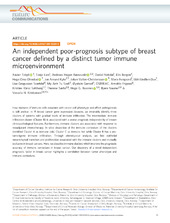An independent poor-prognosis subtype of breast cancer defined by a distinct tumor immune microenvironment
Tekpli, Xavier; Lien, Tonje Gulbrandsen; Røssevold, Andreas Hagen; Nebdal, Daniel J.H.; Borgen, Elin; Ohnstad, Hege Oma; Kyte, Jon A; Vallon-Christersson, Johan; Fongaard, Marie; Due, Eldri Undlien; Svartdal, Lisa Gregusson; Sveli, My Anh Tu; Garred, Øystein; Frigessi Di Rattalma, Arnoldo; Sahlberg, Kristine Kleivi; Sørlie, Therese; Russnes, Hege Elisabeth Giercksky; Naume, Bjørn; Kristensen, Vessela N.
Peer reviewed, Journal article
Published version

Åpne
Permanent lenke
https://hdl.handle.net/1956/23781Utgivelsesdato
2019Metadata
Vis full innførselSamlinger
Originalversjon
https://doi.org/10.1038/s41467-019-13329-5Sammendrag
How mixtures of immune cells associate with cancer cell phenotype and affect pathogenesis is still unclear. In 15 breast cancer gene expression datasets, we invariably identify three clusters of patients with gradual levels of immune infiltration. The intermediate immune infiltration cluster (Cluster B) is associated with a worse prognosis independently of known clinicopathological features. Furthermore, immune clusters are associated with response to neoadjuvant chemotherapy. In silico dissection of the immune contexture of the clusters identified Cluster A as immune cold, Cluster C as immune hot while Cluster B has a pro-tumorigenic immune infiltration. Through phenotypical analysis, we find epithelial mesenchymal transition and proliferation associated with the immune clusters and mutually exclusive in breast cancers. Here, we describe immune clusters which improve the prognostic accuracy of immune contexture in breast cancer. Our discovery of a novel independent prognostic factor in breast cancer highlights a correlation between tumor phenotype and immune contexture.
